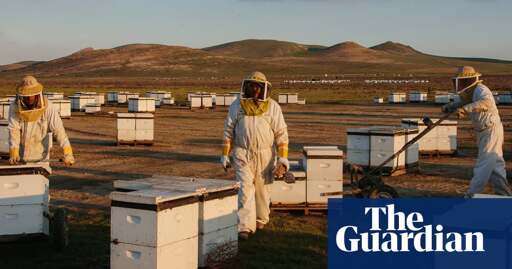Scientists have been scrambling to discover what happened; now the culprits are emerging. A research paper published by the US Department of Agriculture (USDA), though not yet peer-reviewed, has found nearly all colonies had contracted a bee virus spread by parasitic mites that appear to have developed resistance to the main chemicals used to control them.
Varroa mites spreading disease.
Adee says: “We had mites for 20 years, and we never had over 3% losses.” He believes there is a “combination of things” that makes the bees more stressed and the mites more deadly.
He cites the use of neonicotinoid insecticides in the US, which harm bees’ nervous system, paralysing and ultimately killing them. Some researchers have warned of neonicotinoids causing another “silent spring”, referring to Rachel Carson’s 1962 book on the effects of the insecticide DDT on bird populations.
Dave Goulson, professor of biology at the University of Sussex, says the study provided no evidence that the viral load was higher in weaker colonies. “Almost all bee colonies have these viruses, but they only do significant harm when the colony is stressed.”
Capitalism, fucking up the ecosystems since 18th century
In case anybody was wondering, the honeybee declines in China and Europe are also substantial and worrisome. I haven’t heard about Africa but I think it’s safe to assume when there’s missing data for a global problem that it’s affecting them, too.
‘Could’ is doing a whole lot of heavy lifting there.
I think it’s accurate. The article points out that Varroa Mites have become resistant to all known chemical pesticides used to control them previously. So if A) Bees develope resistance tot he virus spread by the Mites or B) humans develop new mite control solutions, then there won’t be a death spiral.
Hello, goodbye, t’was nice to know you
How I find myself without you
That I’ll never know - Honeybee
I let myself go
Are they just farmed European honeybees or our natives dying off too?
Fits perfectly. Fruit that does not grow does not need to be harvested by non-existing farm workers.
Loving this (probably ai) picture there.
Tons of hives - not a plant in sight for miles… I think I found your problem.



